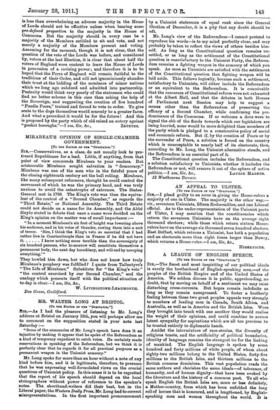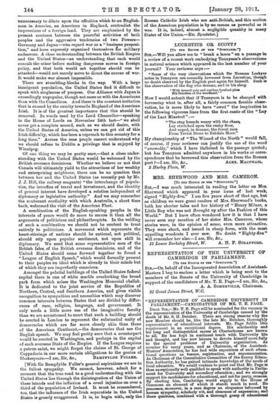A LEAGUE OF ENGLISH SPEECH.
[To THZ EDITOR Or THE "SPECTATOR."' SIR,—The finest and most inspiriting of our political ideals is surely the brotherhood of English-speaking men,—of the peoples of the British Empire and of the United States of America. We seldom discuss it in public, apprehending, no doubt, that by moving on behalf of a sentiment we may raise disturbing cross-currents. But hopes remain indefinite so long as they remain unexpressed. To foster a brotherly feeling between these two great peoples appeals very strongly to numbers of leading men in Canada, South Africa, and Australia, as well as in America and the British Isles. Were they brought into touch with one another they would realise the weight of their opinions, and could combine to arouse latent sympathy for aspirations which are all too precious to be trusted entirely to diplomatic hands.
Amidst the intermixture of race-strains, the diversity of religious tenets, and the artificiality of political boundaries, identity of language remains the strongest tie for the linking of mankind. The English language is spoken by some hundred and forty millions of white people, of whom about eighty-two millions belong to the United States, forty-five millions to the British Isles, and thirteen millions to the British overseas dominions. This vast population reads the same authors and cherishes the same ideals—of tolerance, of humanity, and of human dignity—that have been evoked by the literature and the history of a common past. To all who speak English the British Isles are, more or less definitely, a Mother-country, from which has been unfolded the long roll of heroes that is honoured, and is lengthened, by English- speaking men and women throughout the world. It is
unnecessary to dilate upon the affinities which to an English- man in America, an American in England, contradict the
impressions of a foreign land. They are emphasised by the
present. contrast between the peaceful activities of both peoples and the aggressive tendencies of two Powers—
Germany and Japan—who regard war as a "business proposi- tion," and have expressly organised themselves for military endeavour. A close understanding between the British Empire
and the United States—an understanding that each would consult the other before making dangerous moves in foreign policy, and that both would act together should one be attacked—would not merely serve to direct the course of war. It would make war almost impossible.
There are stumbling-blocks in the way. With a large immigrant population, the United States find it difficult to speak with singleness of purpose. Our Alliance with Japan is exceedingly unpopular, though not more so with the Americans than with the Canadians. And there is the constant irritation that is caused by the enmity towards England of the American Irish. It is of the greatest importance that this should be removed. In words used by the Lord Chancellor—speaking in the House of Lords on November 24th last—" we shall never get a complete accord, such as we should desire, with the United States of America, unless we can get rid of this Irish difficulty, which has been a reproach to this country for a long time." Across the seas people cannot understand why we should refuse to Dublin a privilege that is enjoyed by Winnipeg.
Of one thing we may be pretty sure,—that a close under- standing with the United States would be welcomed by the British overseas doutinions. Whether we believe or not that Canada will ultimately yield to the attractions of her wealthy and enterprising neighbour, there can be no question that between her and the United States (as recently put by Mr.
J. J. Hill, the railway magnate) "the interchange of popula- tion, the interflux of travel and investment, and the identity of general interest have developed a relation independent of diplomacy or legislative authority." And we may remember the exuberant cordiality with which Australia, a short time back, welcomed the visit of the American Fleet.
A combination of the English-speaking peoples in the interests of peace would do more to secure it than all the arguments of politicians and philanthropists. In the welding of such a combination we should not be content to trust entirely to politicians. A movement which represents the heart-stirrings of nations should be national, not political, should rely upon popular sentiment, not upon skill in diplomacy. We need that some representative men of the British Isles, of the British overseas dominions, and of the United States should come forward together to found a "League of English Speech," which would formally present to their peoples an ideal which is already in their minds but of which they are imperfectly conscious.
Amongst the palatial buildings of the United States federal capital there is one of white marble overlooking the broad park from which arises the Washington Memorial obelisk. It is dedicated to the joint service of the Republics of Northern, Central, and Southern America, and gives visible recognition to sympathies and necessities which may discover common interests between States that are divided by differ- ences of race, religion, language, and government. It only needs a little more use of the imaginative faculty than we are accustomed to exert that such a building should be erected in London to represent the substantial unity of democracies which are far more closely akin than those of the American Continent,—the democracies that use the English speech. We may feel pretty sure that a counterpart would be erected in Washington, and perhaps in the capital of each overseas State of the Empire. If the League requires a patron saint, we might forget the claims of St. George of Cappadocia in our more certain obligations to the genius of [With Sir Bampfylde Fuller's general aspirations we are in the fullest sympathy. We cannot, hey/ever, admit for a moment that the true road to a good understanding with the United States lies through the disintegration of the Union of these islands and the infliction of a cruel injustice on over a third of the population of Ireland. It must be remembered, too, that the influence of the Irish separatists in the United States is grossly exaggerated. It is, to begin with only the
Roman Catholic Irish who are anti-British, and this section of the American population is by no means as powerful as it was. It is, indeed, almost a negligible quantity in many States of the Union.—En. Spectator.]























































 Previous page
Previous page